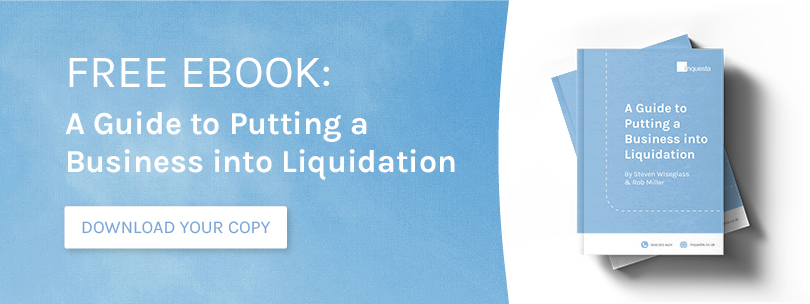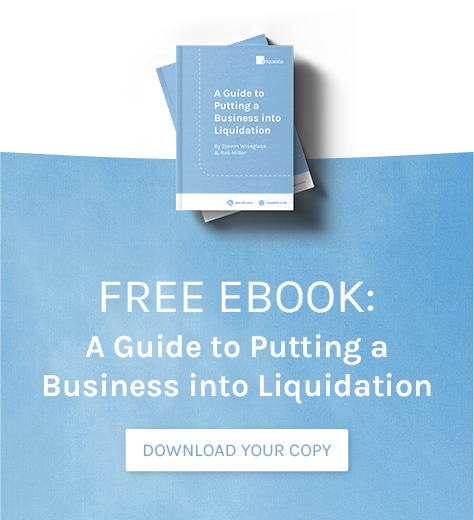Being served a statutory demand can be a stressful situation to be put in — however, the process of challenging a statutory demand can be just as testing and complicated, especially without the required knowledge.
Find out more about statutory demands, what qualifies as legitimate grounds for a challenge, what you should do if a challenge fails, what Inquesta can do to support you, and more in our latest blog.
What is a Statutory Demand?
A statutory demand is a final written warning from a creditor to a debtor. Its contents are centred around formally informing the debtor that should they fail to pay their debt, or come to an alternative agreement within 21 days of the demand being served, the creditor may petition for the company to be wound up.
A formal demand, a statutory demand is only applicable when a debt exceeds £5000 by an individual, and £750 by a business.
Failure to either pay the debt upfront, come to some form of mutually beneficial agreement, or challenge the demand will likely lead to the beginning of the liquidation process.
Grounds for Challenging a Statutory Demand
It is important that you understand exactly what constitutes genuine grounds for challenging a statutory demand before you ever go down this route. An invalid dispute could lead to additional charges being brought against you. Legitimate grounds would be:
- Issues over the amount stated as owed in the demand
- The demand being served incorrectly
- The creditor is seen to owe similar amounts to the debtor
- A demand breaks a previously agreed payment plan
For more information regarding what constitutes legitimate grounds to challenge a statutory demand, see our blog.
The Process to Set Aside a Statutory Demand
If you have received a statutory demand and feel that there are justified grounds for setting it aside, it is important that you follow the protocol to the letter. Failure to correctly fill out the appropriate form within the required 18 day period, and attend the hearing will result in the demand going ahead.

Completion of Forms
For an application to the court regarding issues related to insolvency, the aggrieved party (the creditor) must fill in government form IAA. It is important that you apply to the same court named on your statutory demand.
The act of handing in this form will mean that your creditor will no longer be able to attempt to force bankruptcy as long as the application is under review.
When filling in the forms you should provide the following:
- Details of both parties
- Grounds for why you are disputing the demand
- The date you received the demand
- A copy of the statutory demand
Apply on Time
You must apply to have the demand set aside within 18 days of it being served in the first place.
Should you miss this 18-day period and still wish to apply, it may still be possible to have the demand set aside if you are able to provide valid reasoning for the delay, as long as the creditor has not yet petitioned for bankruptcy.
The Hearing
Should the application for the dismissal of the demand be accepted, the court will set a date for a hearing to discuss your proposal. Both parties will be notified of the information regarding the hearing at least five working days prior to it taking place.
Failure by either party to attend the hearing will result in the forfeiture of the case for that side.

Should your application be successful, the demand will be set aside. Failure will likely result in the creditor applying for bankruptcy immediately, and will lead to you needing to pay court fees.
What Happens if a Statutory Demand Cannot be Set Aside?
If the statutory demand cannot be set aside, the creditor will be eligible to apply for bankruptcy. This can be done at any time after the 21 day period following the statutory demand being served has passed. For any applications more than four months after this date, the creditor will be required to provide additional justification for the delay.
Should the statutory demand against your business not be set aside, there could still be some options available to you that could even be potentially beneficial to both parties, though you will need to act fast.
Company Voluntary Arrangement
A Company Voluntary Arrangement (CVA) is a procedure whereby a business attempts to reach some form of agreement with its creditors regarding new terms for the repayment of overdue debts. Traditionally a CVA will take place over multiple years and often represents an opportunity for the creditor to receive more money in the long run compared to liquidation, while the debtor is able to clear their debts in a manageable time-frame.
In order for a CVA to go ahead, a majority of both creditors and shareholders (in value) is needed. This can be a difficult sell so it is important, should you wish to go down this route, that you make your proposal absolutely watertight.
Administration
Should a business be faced with serious financial difficulties, such as in the case of a statutory demand not being set aside, administration can be one final lifeline for the struggling company. In the process of insolvency, an administrator will be appointed who will attempt to recover all owed money in order to repay creditors as soon as possible. However, they will also attempt to turn the business around from the inside, to build it up for a more sustainable future.
Unfortunately, a business faced with administration is likely to be one in dire financial straits. Therefore, it is possible that the financial issues could be unresolvable and the firm could be shut down, despite the best interests of all parties.
For information on additional insolvency services to protect your business in the event that a statutory demand cannot be set aside, contact a member of the Inquesta team.
Expert Statutory Demand Help from Inquesta
The dedicated team of tax debt and insolvency specialists at Inquesta not only possess decades of experience supporting businesses in difficult financial positions, they also are dedicated to providing a top notch service that puts the needs of our clients before all else.
We understand how tough a situation a statutory demand on your business can be, and we know what the best options are to help get you clear out the other side with as little complication as possible — for a brighter future for your business.
For more information on what Inquesta can do to help, contact a member of our team today or request a no-obligation consultation.




